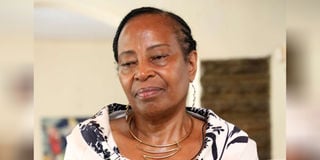
Lady Justice Anna Ngibuini Mwaure at her home in Nairobi.
High Court Judge Anna Ngubuini Mwaure woke up on April 14, 2022 in high spirits. As a Christian, Justice Mwaure of the Employment and Labour Relations Court knew by heart the scripture in Psalm 118: 24: “This is the day the Lord has made; We will rejoice and be glad in it.”
However, there was a second reason for waking up to a day full of promise- it was her birthday and she had various activities lined up to commemorate this important milestone in her life.
Then came the text message on her phone that would not only shatter the plans for the day but also have far-reaching ramifications on her, her family and many friends and relatives; the effects of which are still felt to date.
“Rush to Karen. It is about Gathoni and it is very serious,” the terse text from the doctor at the medical facility where her last born daughter Lil Gathoni Mwaura had been admitted said. The facility is in the Nairobi's Karen neighbourhood.
She immediately called her husband, the 2022 presidential candidate of Agano Party David Waihiga Mwaure who was on his way to the gym. He turned back and arrived at their home off Nairobi's Waiyaki Way almost immediately.
“I shared with him the text message and we immediately set off for Karen. Call it motherly intuition but somehow deep down in my heart, I had this premonition that my daughter was no more,” she tells me as we settle for an interview in her home.

Lady Justice Anna Ngibuini Mwaure and her husband David Waihiga Mwaure at their home in Nairobi.
Justice Mwaure is motherly and weighs her words carefully, a practice born out of decades of sitting in the judgment seat, listening to petitioners, defendants and lawyers arguing cases before making a ruling, as a magistrate and now as a judge.
However, as I sit across from her and gaze into her face, it is easy to see moments of pain pass as she recalls the events surrounding the death of Gathoni, who battled bipolar disorder and depression for about 15 years of her young life.
Justice Mwaure describes Gathoni not only as her daughter but as her best friend.
“Whenever I went somewhere you would be sure Gathoni would be right behind me,” she says. Because of her joie de vivre nature, the Mwaures preferred to call Gathoni ‘Gakenia’ Gikuyu for a joyful individual.
These were the warm thoughts of her daughter coursing through Justice Mwaure’s mind as they sped towards Karen that early Thursday morning. Somewhere along the way, she was on the phone with the doctor once more and this is when he broke the sad news.
“Please go to Lee Funeral Home, your daughter’s body is there,” he said.
Justice Mwaure saw her world collapse. On reaching the morgue, Mr Mwaure asked at the reception if her daughter had been taken there. The answer was in the affirmative.
“My husband proceeded to view the body but I could not get the strength to do so. I looked for a room and sat there and cried my heart out. Soon, relatives and friends heard the news and made their way to Lee. After some time, they managed to convince me to go view the body.”
Two years later, the circumstances surrounding Gathoni’s death remain scanty, and investigations are still ongoing to establish the cause.
What stuns the family is that Gathoni had shown marked improvement at the medical facility where she had been admitted and she was all set to be discharged and go back home.
“One of my sisters was visiting from the United Kingdom, and we went with her to visit Gathoni and we found her in very high spirits. In fact, we had planned to include a visit to her as part of my birthday celebration,” Justice Mwaure discloses.
In Gathoni’s perpetual memory, Justice Mwaure has written a book ‘God’s Special Children’ in which she lifts the lid on what many people in Kenya- and indeed Africa- consider a taboo subject- the issue of mental health challenges for both those living with it and the caregivers who in most cases are the parents, spouses, siblings or the children.
“In this book, I am talking about conditions like Attention Deficit Hyperactivity Disorder (ADHD), bipolar, depression and the like. In fact, any condition that makes someone not perform optimally in career, education or any endeavour they engage in,” she says.
She says Gathoni was open about her battles and her fierce fight to achieve the things she was passionate about.
“She was passionate about teaching kindergarten children. Apart from that she was also a theatre enthusiast and actress. To her credit, Gathoni managed to acquire two Master’s degrees despite her condition,” Justice Mwaure says, a tinge of pride evident.
There is a lot of stigma around mental health issues which makes many not want to admit they or their loved ones are battling, I proffer to the judge, a suggestion she agrees with.
“It was a struggle for us to get experts or institutions dealing with Gathoni’s condition and we would consider ourselves a bit better off than many in Kenya. I believe it is a big battle for many people in this country,” she says.
When she opened up and told people the struggles her daughter was going through, Justice Mwaure would be received with revelations from people who were also facing the same battle albeit in private.
She feels if many more, especially those in high positions in society would go public, it would help in the fight against the stigma currently swirling around mental health.
The book’s publisher Edward Ondachi of Hadithi Publishing Hut says: Justice Mwaure going public about her daughter’s battles and even writing a book about it is a huge thing. She is not just anybody- a judge of the High Court, a wife to a 2022 presidential candidate and a person of good standing in her immediate society and the church. Hers is a powerful voice in raising awareness around mental health issues nationally and beyond.”
The book will be launched on April 19 in Nairobi and will also be available on Amazon.
Justice Mwaure admits that there are some things she was not aware of and which Gathoni was struggling with.
“In many instances, we as the parents would dole out advice and ask her to try this remedy or see this specialist. We did not understand that at times all this was tiring to her,” she says.
One thing that makes Justice Mwaure proud is that she and her family tried their best to give Gathoni the best care possible.
“I went through her diary and saw an entry in which she said she was happy with the support her family was giving her.”
It was from the same diary that Justice Mwaure found many entries on Gathoni’s day-to-day work as a kindergarten teacher. In her honour, the family condensed the diary into a book. ‘Secrets of a Kindergarten Teacher: A Humourous & Heart Warming Perspectives from a Teacher’ is written humorously as Gathoni describes her pupils and their likes and dislikes.
The judge admits that caregivers at times can get overwhelmed and that if not careful they might end up breaking down. The nature of some of the mental illnesses is that there would be extreme mood swings that leave those around the patient dumbfounded.
“A good example is when Gathoni graduated with her second Master’s degree. It was during Covid, and we had a small bash [party] for close family members. As usual, Gathoni was the heart of the party, making sure that everybody enjoyed it to the maximum. A few moments after the last guests had left, I passed by her bedroom, and I could hear someone sobbing inside. When I opened the door, I found her curled up in the bed crying. Apparently, her chemicals had gone down and she was feeling sad soon after the euphoria of the party.”
Unfortunately, the uptake of mental health illnesses understanding is still low in Kenya, Justice Mwaure says.
Drawing parallels from Gathoni’s life in Kenya and the time she spent in the UK pursuing education, Justice Mwaure says there is a world of difference.
“The systems there worked in favour of someone dealing with a mental condition. Social workers would constantly check on her and would call an ambulance to take her to the hospital if need be. This way, she was able to pursue her studies quite comfortably despite her condition,” she says.
The judge wants the silence and stigma around mental ailments broken.
Labelling the patients is not the way to go, she asserts. “You find that there are times when the person dealing with the condition resorts to alcohol or even drugs as a coping mechanism. Then we label them ‘mlevi’ (alcoholic) or any other names. This is doing more harm than good to these people,” she says.
She says that Gathoni’s main mission in life was to help people and that the family wants that to be the memory the world has of her in death.
“As a mother whose child went through so much, I want to talk to parents and the population in general. People should not shy away from talking about mental health ailments because it is just a medical condition like cancer or any other disease,” she says.
Justice Mwaure is a born-again believer, a member of Christ is the Answer Ministries (Citam) Valley Road.
When Gathoni passed on, the entire church leadership rallied to comfort the Mwaure’s with the Presiding Bishop Calisto Odede officiating the funeral service.
Does she feel God let her down or abandoned her in the whole scenario? I pose to her that from experience, I know that such a tragedy can either strengthen one’s faith or make one lose their faith altogether, by concluding that God failed them at the critical hour.
“I asked God a lot of questions and I still have those questions. I also read the book of Job which deals with the subject of grief many times. Over the years I did pray for Gathoni’s healing. However, what I know is that although we lost her, God never let us down,” she says.
She adds: “He was with us throughout Gathoni’s battle with illness and He was with us in her death. Psalms Chapter 23 offered me strength and I am grateful to the many friends who offered encouraging words and literature to read.”
“I went back to work after a month and there were days I would finish work and go lock myself in the toilet and cry my heart out. But I know that God healed Gathoni through eternal life and that one day we shall be reunited.”
Another thing that keeps me going is that when we held Gathoni’s memorial, I felt the Holy Spirit say to me that, I don’t believe that the God I have served since I was a teenager is a sadist or malicious…believe me we will bounce back!” she concludes.











